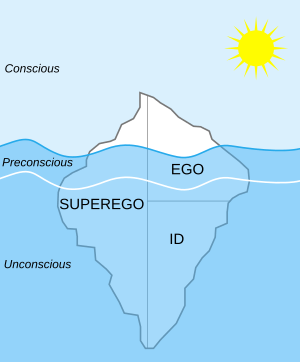Id, ego, and super-ego facts for kids
The Id, Ego, and Super-Ego are important ideas from Sigmund Freud, a famous thinker. These three concepts help us understand how the human mind works. They describe different parts of our personality and how they interact.
Freud thought of the mind as having these three parts. The Ego, and sometimes the Super-Ego, are what we are aware of. The Id stays hidden in our unconscious mind. Together, they shape who we are.
These are not actual parts of your brain you can see. Instead, they are ways to think about different functions of your mind.
Contents
The Id: Your Inner Desires
The Id is the part of your mind that is always there. It's like your basic, natural instincts and desires. The Id wants things right now! It follows the 'pleasure principle'. This means it always seeks immediate fun and avoids pain.
Freud described the Id as the source of all our needs and strong feelings. It's the "dark, hidden part of our personality." It doesn't plan or think ahead. It just demands that its desires are met immediately. For example, if you're hungry, the Id just wants food now, no matter what. The Id develops first in a person's life.
The Ego: Your Practical Self
The Ego is the organized and realistic part of your mind. It's like the "common sense" part. The Ego helps you make decisions, understand the world, and remember things.
The Ego follows the 'reality principle'. This means it tries to find practical ways to get what the Id wants. It thinks about the long-term results of your actions. For example, if the Id wants a candy bar right before dinner, the Ego might say, "No, wait until after dinner, or you'll spoil your appetite."
Freud said the Ego is the part of the Id that has learned from the outside world. It tries to balance the strong desires of the Id with what is possible in the real world. It also has to deal with the rules from the Super-Ego. The Ego's main job is to keep you safe and help you succeed. While some of the Ego's actions are conscious, not everything it does is something you are aware of.
The Super-Ego: Your Conscience
The Super-Ego is the part of your mind that aims for perfection. It acts like your inner critic or conscience. It tells you what is right and wrong. It includes your ideals and goals for yourself.
The Super-Ego can make you feel guilty if you do something wrong. It's like the little angel and devil on your shoulders, telling you what you should or shouldn't do.
The Super-Ego has two main parts:
- Conscience: This part tells you what actions are right or wrong. It makes you feel bad (guilty) if you do something you shouldn't.
- Ego-Ideal: This is your idea of your perfect self. It's who you want to be. You compare your actions to this ideal.
Both parts of the Super-Ego develop from your experiences with others. They come from learning rules and values from your parents, teachers, and society. A strong Super-Ego helps you control your basic instincts from the Id. A weak Super-Ego might let the Id's urges take over more easily.
See also
 In Spanish: Ello, yo y superyó para niños
In Spanish: Ello, yo y superyó para niños
 | Lonnie Johnson |
 | Granville Woods |
 | Lewis Howard Latimer |
 | James West |


